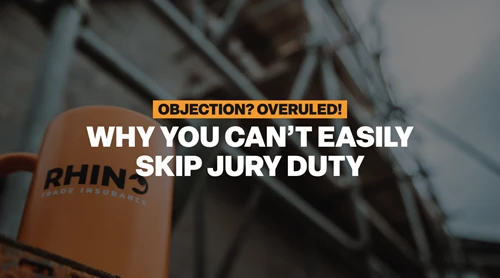Sick pay isn’t a given when you work in the trades. However, in some circumstances you could qualify for sick pay, so it’s vital to check you’re claiming what you’re entitled to.
When you're off work sick as a tradesperson employed by another company, you may qualify for Statutory Sick Pay (SSP). What you’re paid depends on your personal situation and earnings. Don’t forget that as a business owner, you must ensure you provide the correct sick pay rights to any employees you have.
Today, we will explore SSP, how you can ensure your business meets the regulations, and how insurance can help you cover sickness if you’re a sole trader.
What is Statutory Sick Pay (SSP)?
Employees of a trade business who get ill and can't work may be entitled to Statutory Sick Pay (SSP). To qualify, they must have missed four or more consecutive days of employment (including non-working days).
The first three days of illness are called ‘waiting days.’ The fourth day is the ‘qualifying day,’ after which you may begin receiving SSP. These days must be consecutive, i.e. if an employee starts work on day 3 before downing tools and stopping work due to illness, that day is not considered a sick day.
Employees are eligible for statutory annual leave during periods of sickness, so holidays may be taken during this time. This is regardless of how long they are away from work, from a minimum of four days to several months. However, this is at the employee’s discretion. Employees who qualify for sick leave legally cannot be forced to take annual leave at the same time.
Employees being ill has a knock-on effect and can mean work needs to be rescheduled, so good communication between employees and employers is crucial. You, as the employer, should establish a deadline by which workers must inform you that they are ill. If you don’t do this, the deadline defaults to seven days (which isn’t exactly ideal, so make sure you get a deadline in place).
Find out more about SSP on the Government website.
What about company sick pay (CSP)?
The minimum that employers must provide when employees are ill is the national SSP rate.
However, as an employer, you may run your own sick pay scheme, also known as ‘company sick pay’ or ‘contractual sick pay.’ (CSP). This is a great benefit that some employers offer to keep their staff happy and aid staff retention.
If your employee qualifies, you may pay them CSP in addition to SSP when they’re off ill. You can’t choose between paying SSP or CSP - if the employee qualifies, they should receive both. The employment contracts you provide your employees should set out their entitlement to CSP.
What are the criteria for SSP?
If you work for an employer or hire any staff members, the standard conditions of statutory sick pay will be the following:
- You must possess a contract of employment
- You have started work under that contract
- Have missed four or more days of work in a row due to illness
- Be paid at least £123 per week (known as the lower earnings limit).
- Inform you or your employer of the illness and provide medical documentation after 7 days.
Information from The Advisory, Conciliation and Arbitration Service (ACAS) states that agency, casual, and zero-hour workers who fulfil the set criteria can receive SSP.
There are some situations in which an employee may not be entitled to sick leave. These include workers receiving Statutory Maternity Pay and those who have already received the full 28 weeks of SSP.
Employees will be able to take time off for illness for the following reasons:
- If they were given Employment and Support Allowance, which was within 12 weeks of starting or returning to work
- If they are working outside the EU and you are not required to pay their National Insurance contributions
- If they went on strike, were in custody on the first day of sickness, or were off work due to an illness stemming from pregnancy in the four weeks before the week their baby is due.
Employees who experience illness frequently may also experience "linked" times of sickness. Linked periods indicate that SSP entitlement depletes slowly. If an employee is off for four weeks and becomes sick again within 56 days of returning to work, they will still have 24 weeks of SSP remaining because these linked periods must each last four or more days and be eight weeks or less apart.
How much does Statutory Sick Pay provide?
- The SSP rate again increased to £109.40 per week as of April 6, 2023.
- You have the option for up to 28 weeks of sick leave, with the SSP being applicable.
There is a daily SSP rate if you or an employee is not off work for the entire week. The number of eligible days your employee typically works and the number of sick days they take each year determines the daily SSP rate.
How can you or one of your employees prove they are sick?
If you, as an employee or one of your employees misses more than seven consecutive days of work (including non-working days), an employer may request a sick note, also known as a medical note.
A health professional or doctor who is qualified to issue this includes the following:
- Registered nurse
- GP or hospital doctor
- Physiotherapist
- Pharmacist
- Occupational therapist
For more information on the details surrounding sick pay, your rights and how a business should deal with it, read more on the Citizens Advice page.
What about as a self-employed individual?
We’ve looked at sick pay for employees, but what about independent contractors? Unfortunately, despite all the amazing benefits of working for yourself, sick pay isn’t one of them.
But there is a simple solution. As a self-employed tradesperson, you can protect yourself if you get sick or injured and are unable to work with Income Protection Insurance, or Personal Accident Insurance. Both of these policies will pay out if you’re unable to work through sickness or injury, helping you cover your bills and expenses during your period of recovery. These types of insurance are very common, with most tradespeople having the good sense to have them in place.
Income Protection Insurance from Rhino Trade Insurance is probably the best cover you can find anywhere in the UK. This policy will pay you a monthly benefit of up to £2,500 while you get back on your feet. Rhino also offer outstanding Personal Accident Insurance, which will pay you a lump sum of up to £50,000 while you’re unable to work.
Why choose Rhino Trade Insurance?
When it comes to business insurance, few could offer a better service than Rhino Trade Insurance. We provide a host of affordable, quality and easy-to-use policy options for tradespeople and understand that your time is money - so we don’t waste it.
Are you interested in knowing more about our policies? All of our insurance options can be specifically tailored to meet the demands of your industry and company. Want an instant price? Take advantage of our easy-to-use quote engine and get covered in just 60 seconds.
If you’d rather contact or chat with us, call 0116 243 7904 to reach our friendly UK-based team.




